A year and a half after the protest at the Democracy Monument on 18 July 2020, the youth-led protests have expanded into a popular movement including issues from labour rights and gender equality to religious reform and monarchy reform.
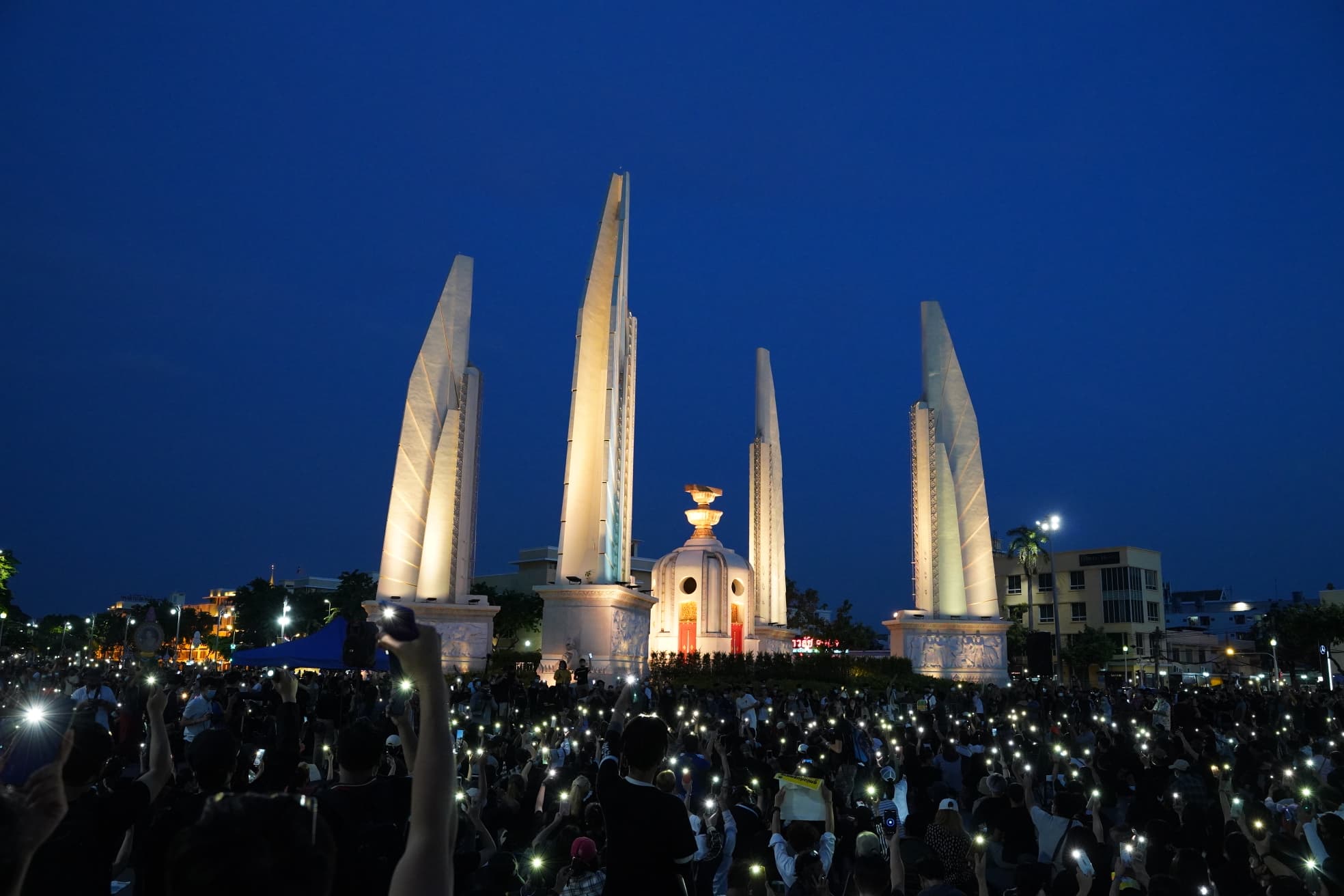
Protesters gathering at the Democracy Monument on 18 July 2020
- A compilation of interviews with participants in the youth-people movement which show the diversity of the shades of the dreams of this group of people. Other than the 3 basic demands, there are issues of welfare/labour rights; freedom/justice in education system; the right to land/a resource base; LGBTQ rights, feminism and anti-patriarchy; restoration of religion; and problems in the government’s administration especially with COVID;.
- Reflect back on 1 year of breaking the ceiling and the movement for monarchy reform from the perspective of Lawyer Anon.
- A compilation of almost a thousand cases of getting thrashed and accusations of overthrowing the system of government , revealing what protest observers discovered about protest suppression since the 14 Oct royal motorcade.

Anon Nampa spoke at the 3 August 2020 Harry Potter-themed protest. His speech was the first time monarchy reform was publicly addressed by the 2020 - 2021 youth-led movement.
Until it became the 3 demands
The movement led by the young, students and the people, was later called the Ratsadon Group (‘People’s Group’). Going back to early 2020 after the Constitutional Court ruled to dissolve the Future Forward Party, students from various universities started to hold flash mobs to express their dissatisfaction with the political injustice. At that time, the events often took place inside the universities, and disappeared in early March due to the spread of Covid-19. The protests returned in June 2020 after the enforced disappearance of Wanchalearm Satsaksit, a political activist in exile . Activist groups responded to step out and call for Wanchalearm to be found, leading to various charges. On 18 July 2020, a large protest at the Democracy Monument, led by Free Youth and the Student Union of Thailand (SUT), issued 3 major demands: 1) stop intimidating the people, 2) dissolve parliament; and 3) amend the constitution.
- Student protests in Ubon Ratchathani and Chiang Mai echo Free Youth’s demands
- More students join wave of anti-government protests
- Despite resistance from universities, student protests go on
- Youth-led rally against the government in Chonburi
- Youth protests continue in Pattani, Ayutthaya, Pathum Thani, Khon Kaen
- Triam Udom and Kasetsart students rally against the government
The flash mobs then returned and spread across the country. An important marker was set down at the protest on 3 August 2020 led by the Mahanakorn for Democracy Group and the Kased Movement using the theme of Harry Potter. Anon Nampa, a human rights lawyer, made a speech demanding monarchy reform. He stressed that he wanted to convert the frustrations of the young protestors at that time, who often displayed signs or posted opinions on social network, which got them prosecuted or threatened, into a direct demand for the reform of the monarchy. Things became clearer on 10 August 2020 at the protest stage ‘#Thammasatwillnotendure We don’t want reform we want revolution,’ held at Thammasat University’s Rangsit Campus by the United Front of Thammasat and Demonstration (UFTD) where the 10-point demand for monarchy reform was announced.

Student activist Panusaya Sithijirawattanakul read out the 10-point demand for monarchy reform during the 10 August 2020 protest.
Important events before the 3 major demands
- 18 July 2020: Free Youth and SUT organised a protest with 3 main demands: 1) stop intimidating the people, 2) dissolve parliament and 3) amend the constitution
- 3 August 2020: At a protest led Mahanakorn for Democracy Group and the Kased Movement, Lawyer Anon made a speech about monarchy reform
- 7 August 2020: Free Youth’s 3 demands and 2 standpoints were launched. The demands were 1) stop intimidating the people, 2) draft a new constitution and 3) dissolve parliament. The standpoints were 1) there must be no coup and 2) there must be no national government.
- 10 August 2020: The United Front of Thammasat and Demonstration held a protest with 3 demands: 1) stop intimidating the people, 2) dissolve parliament, and 3) draft a new constitution; and 2 standpoints; 1) no national government, and 2) no coup. They also proposed changes in the relationship between the monarchy and Thai politics, or the 10 demands for monarchy reform.
- 16 August 2020: Free Youth held a protest with the same 3 demands and 2 standpoints as on 7 Aug, but adding 1 dream: having a “democratic form of government with the monarch under the constitution”.
- 19 September 2020: The UFTD held a protest to submit 10 demands for monarchy reform through the Commissioner of the Metropolitan Police Bureau of the Royal Thai Police.
- 8 October 2020: A united front of students and people from over 30 organisations gathered in the name of the Ratsadon Group to hold a large protest on 14 Oct to make 3 demands: 1) the resignation of Gen Prayut and his circle; 2) an immediate parliamentary session to accept the people’s draft constitution; and 3) reform of the monarchy so that it comes under the constitution according to a democratic form of government.
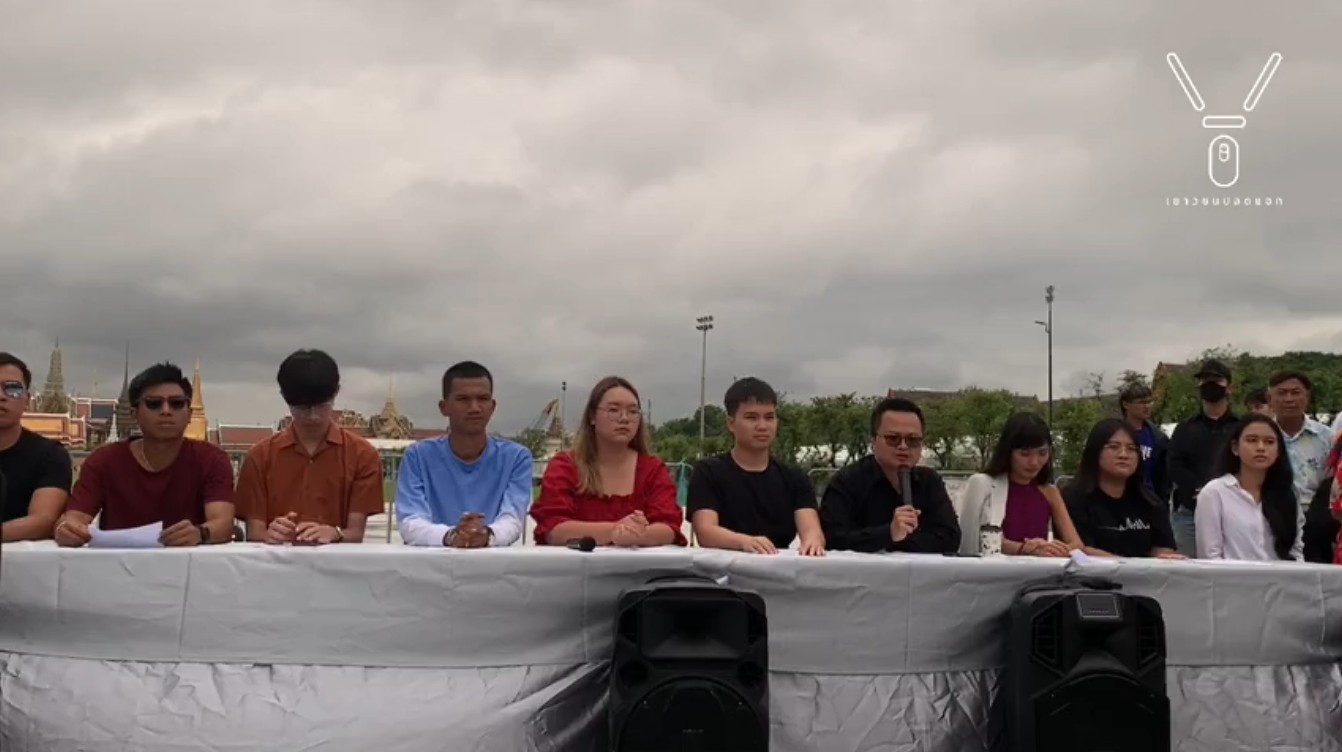
The press conference on 8 October 2020 announcing the establishment of the activist network 'Ratsadorn'
From then on, the regular 3 major demands were: 1) resignation of Prayut and dissolution of parliament; 2) a new constitution; and 3) monarchy reform.
This resurgence, not only in the increased number of protests and their geographical spread and in the increased level of demands, saw also an increase in prosecutions.
Prachatai interviewed activists, youth and those who were prosecuted since the start of the year to understand their perspectives and ideas. Other than the 3 headline demands of the movement, each group of protestors or activists has its own agenda to present, including their specific issues which they connect to the basic demands.
Welfare state and labour rights
A welfare state or social democratic policies in administering welfare and allocating resources across the state is another topic that came under very intense discussion during the 2019 elections, when all political parties presented more policies on welfare. In the people’s protests there was more discussion, such as by We Fair, the Labour Network for People’s Right and the Workers’ Union.

Chanin Wongsri
Chanin Wongsri, a Thammasat student from the Puey Ungphakorn School of Development Studies, who was charged under Section 112 after reading the Thai-language declaration in front of the Embassy of Germany in the 26 October protest, gave an interview where he said his original interest in the welfare state was the Nordic Model of state budgeting, and on that day he talked about Section 6 of the Constitution and whether the budget for the monarchy is too much. If it’s too much, we should be able to criticise it. He raised the example of how much the U.K. monarchy budget was, and how the budgets of the monarchies of Sweden and Denmark were used. Then he said, ‘But in Thailand we can’t say this, because there’s Section 112, there’s Section 6, protecting the King. So then how will we know if this money is being spent effectively or not?’ At that time, they joked that they were charged under Section 112 for talking about a welfare state.
The reason Chanin is interested in the welfare state is because he read political and economic books, and studied life quality indices of various countries and found that people in the Nordic countries, Denmark, Finland, Norway, Sweden and Iceland, have a good quality of life because they have comprehensive basic welfare state systems.
Freedom and justice in the education system
In the recent movement, as well as university and college students, younger students also had important roles, such as the Bad Student group, Thai student, KKC Pakee Students and Reset and Revolution Education Thailand. So they were often seen campaigning alongside the Ratsadon Group and also holding their own regular activities, for example, calling for an end to intimidation of students, cancellation of outdated rules which oppress students, violate human rights according to international principles and diminish the human dignity of students, and reform of education to eliminate inequality, inaccessibility, poor quality curriculum, the burden of work on teachers, inappropriate teacher behaviour, among others.
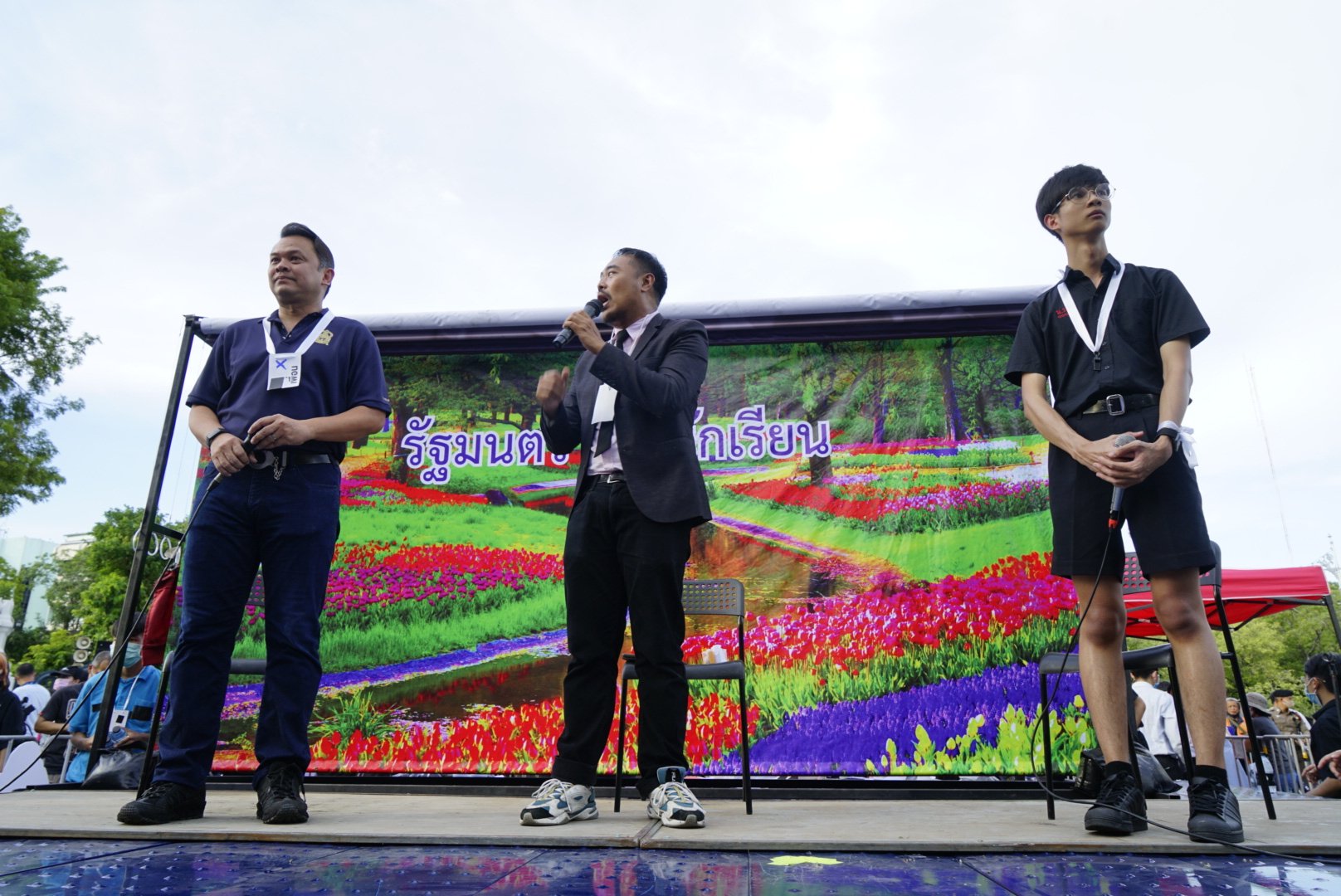
The student rights activist group Bad Student staged a protest at the Ministry of Education on 5 September 2020.
Poisian (alias), a 15-year-old who was charged with violating Section 112 at the 20 March protest, said in an interview with Prachatai that during his high school days, he wants to push forward education issues, such as educational inequality. He wants all children to receive an equal education without needing to take competitive exams in order to gain educational opportunities. He himself had to struggle to pass an exam for his desired high school course, since his previous school did not have the course he wanted to take. He thinks that all children should be able to learn what they are interested in without needing to sit an exam. Thai education can be good; everyone needs to come out and help solve the issues together, not just students. In addition, we also need to fix structural issues and politics to push forward policies.
Land rights and right to resources
The state and capitalist groups often have the power through the law to seize and take over the land rights of local people. This is reflected in policies and various laws such as the National Park Act, especially during the era of the NCPO which issued a ‘take back the forest’ policy. This affected the movement calling for opposition to these policies starting from policy implementation, or specific cases like the state eviction of the Bang Kloi Karen people from their land in Kaeng Krachan District, Phetchaburi Province, which resulted in an opposition movement under the name of the #SAVEBangKloi Party. They joined with the Ratsadon Group and many activists in Ratsadon campaigned to support this party, raising the specific issue of Bang Kloi, and also of land rights overall.
‘Hugo’ Jiratita Tammarak, a 23-year-old new generation activist in Ratsadon, was charged under Section 112 for making a speech at the 2 Dec 2020 protest at Ha Yaek Lat Prao. She is a member of the Isaan Land Reform Network and talked about the issue of land, which many often view as something distant and belonging to specific groups, whether the Bang Kloi Karen or the case of Den Khamlae, a village land rights leader in Khok Yao forest, Chaiyaphum Province, who was disappeared. But in reality, this is a structural issue which touches us all.

Jiratita Tammarak (left)
“Issuing laws which favour capitalists and the government has caused great trouble to communities – taking back the forest without ever looking to see who was already there before, or having no policy to support or compensate those whose land has been taken to mitigate their troubles.”
For the big picture on the monarchy, Jiratita thinks that it is an institution which owns a large amount of land in the country. It may not cover everywhere, but it is often used to accumulate capital, for power and as a factor of production, until it turns into socially structured inequality. She pointed to the declaration of land for royal projects or dams in many areas, where many villages were expropriated to build dams, with serious problems of compensation for the villagers.
LGBTQ rights, feminism, and anti-patriarchy movement
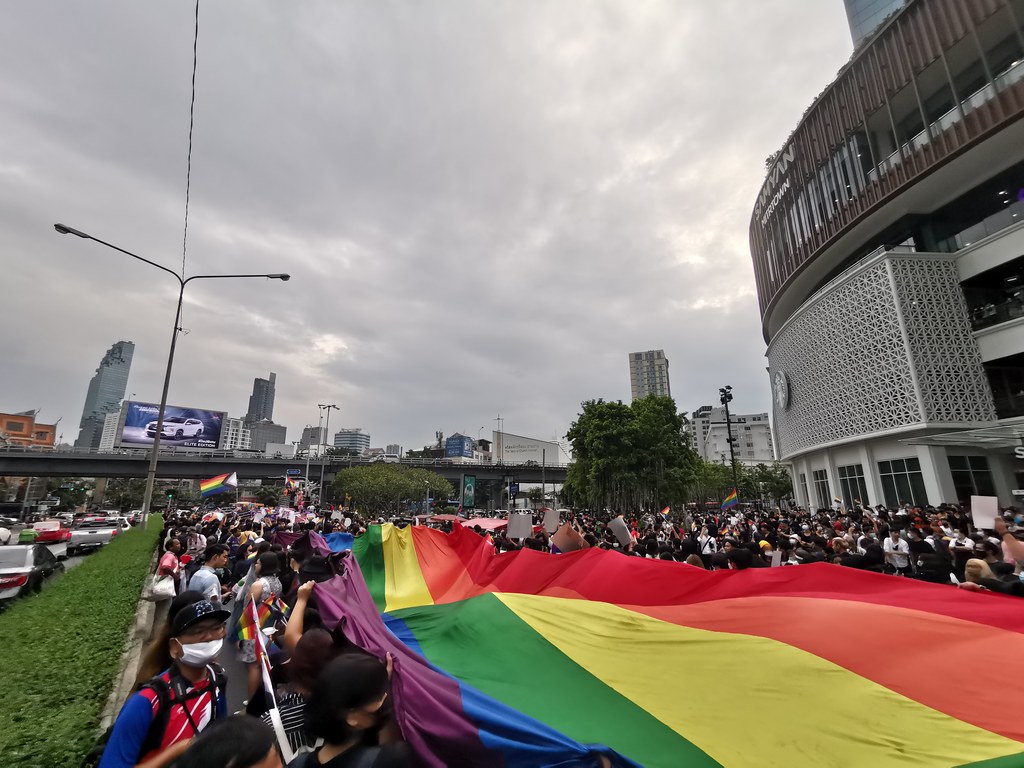
Participants in the 7 November 2020 Pride parade holding a large Pride flag
This could be called the colour of this new generation movement in the issue of LGBTQ rights and feminism, led by the activist group Women for Freedom and Democracy, whose name was later changed to Feminist's Liberation Front Thailand, hoping to create awareness on gender equality. Participation is not limited to women alone, and they support the 3 demands of the Ratsadon Group but they must not have sexual harassment issues.
Mimi, a 17-year-old gender equality activist, became one of those charged with violating the Emergency Degree and Public Assembly Act after making a speech at a protest at the Ratchaprasong intersection on 25 Oct 2020. Mimi said that they started taking political action on the issue of gender equality together with Feminist's Liberation Front Thailand and Free Queer and Non-binary.
Mimi was one of the organisers of the Sita Lui Fai performance, adapted from A Rapist in Your Path (Un Violador en Tu Camino) by the feminist group Las Tesis in Chile, which later was used to call for gender equality in various countries in opposition to sexual violence, a victim-blaming culture and patriarchy in society.

Mimi (second from right)
“I think everyone should be a feminist, because if we’re a real democracy, the people should be the ones in power. Everyone should be equal, no matter what their gender or class,” Mimi said.
“I think that the democracy we dream of is not just that everyone has the same amount of voice, but I think it is that whatever fundamentally is your gender, birth or mind, you should be treated equally.”
The New Restoration group and religious reform
Within the Ratsadon movement, other than lay people, we also often see monks and new generation novices participating. They call themselves the ‘carrot gang’ or their official name, ‘New Restoration.’ They want the clergy to come out of the centralised state authority and adjust the structure so that monks self-govern, in accordance with democracy, heading towards becoming a secular state.

Young monks and novices are often seen participating in protests, and are often seen using the orange carrot dharmachakra symbol, since they have been called the "carrot gangs" by younger people due to the colour of their robes.
Monk Phra Chitsanuphong Phraiphari and Novice Saharat Sukkhamla, a student majoring in religious studies at the College of Religious Studies, Mahidol University, who are members of New Restoration, said that the ways monks are governed is a reflection of a political society that is not a democracy. Everything is centralised at the Sangha Supreme Council and the National Office of Buddhism. Some regulations also are not based on religious discipline, such as giving the absolute right to the temple abbot to govern monks under his care, using monks as a tool of the state, and discrimination under double standards. An issue this large needs considerable agreement within monk circles to be able to advance. The point is then whether the monks are ready or not to reform the Sangha Act and free themselves from the centralised authority of the Sangha Supreme Council.
Saharat was the first novice to be charged under Section 112 on 9 Nov 2021. He recently left the Buddhist monkhood and declared himself a ‘communist’ who will continue to advocate political and economic equality for the people, which capitalism cannot give.
Problems in the government’s administration, especially with regard to COVID
Beginning on 7 Aug 2021, Free Youth gathered at the Democracy Monument to march to the residence of Gen Prayut Chan-o-cha, which is located inside at the barracks of the 1st Infantry Regiment, King's Close Bodyguard, on Vibhavadi Rangsit Road, but the protest ended in confrontation with Crowd Control Police. Even when the protest leaders announced the end of the protest, police still used tear gas, rubber bullets and chemically-laced water cannons to suppress the protesters remaining in the Victory Monument-Din Daeng intersection area. Almost every evening after that there were regular independent protests around Din Daeng and Mitmaitri Road, held in the name of Thalugaz, to confront the police in the area. There were many injured, including Warit, a 15-year-old who was shot in front of Din Daeng police station on 16 Aug 2021 and passed away in hospital 2 months later. Many more were arrested and prosecuted; Thai Lawyers for Human Rights stated that at least 498 were arrested in no less than 167 cases.
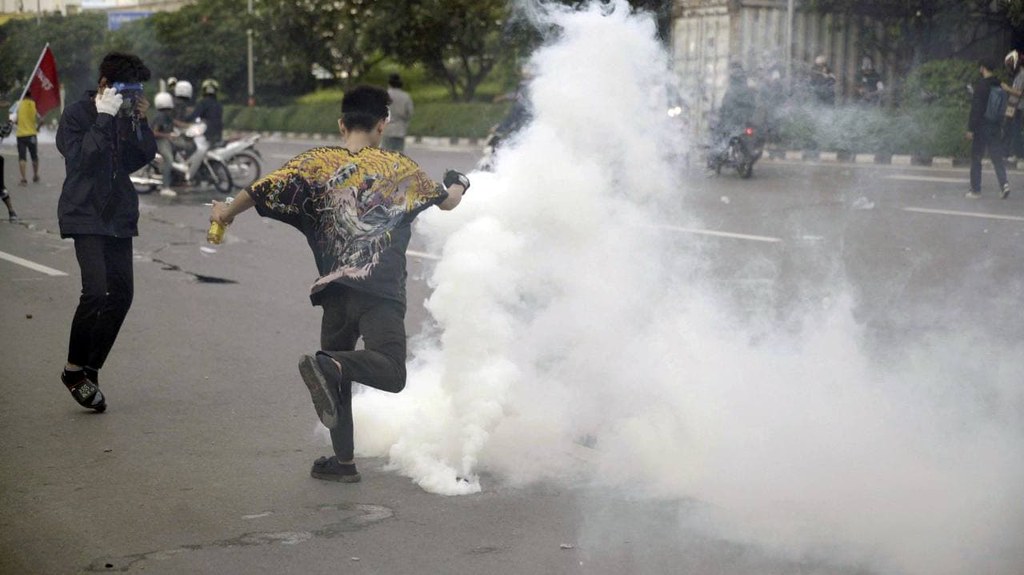
A clash between protesters and crowd control police on 29 August 2021 (Photo by Nontawat Numbenchapol)
The admin of the Facebook page ‘Thalugaz’ (who later resigned), said in an interview that an evaluation by the frontline operations team found that participants in the Din Daeng protests are mostly from marginalised urban communities severely impacted by the government’s administration.
“They don’t have demands like other protests, such as ‘Prayut resign’, ‘new constitution’. It’s not this at all. Their demands are a new government, new people to govern, and vaccines. They want their parents to return to work.”
“The issue of individual survival is not one they need to crystallize from socio-political theories, but is something they are directly affected by,” the ‘Thalugaz’ FB page admin stated.
This is in line with the virtual seminar “Searching for meaning under the carpet; third generation youth at Din Daeng intersection” organised by the Youth Health Promotion Network together with the Child Youth and Family Foundation on 18 September. Ticha Na Nakorn, the then Director of the Baan Kanchanapisek Vocational Juvenile Training Centre for Boys, said that from following the news she found that some former Baan Kanchana children participated in the protests. There are many groups, each going there separately. Some invited others. But what they found was that 1) they are vulnerable groups affected by COVID, both themselves and family members who got sick, but their access to treatment is near zero – difficult, complex, and affecting their attitude, making them angry; and 2) household debt has increased, both old and new debt, and there are no jobs either.
1 year the since the ceiling was broken and the movement called for monarchy reform
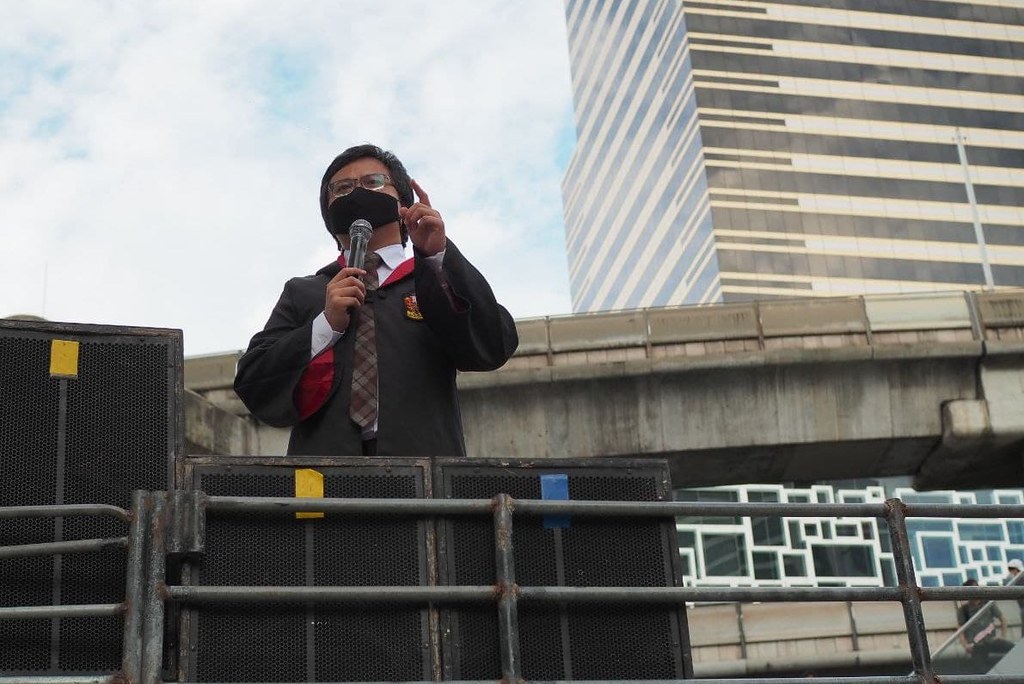
Anon Nampa reiterating his call for monarchy reform during the 3 August 2021 protest at the Bangkok Art and Culture Centre (BACC)
On 3 August 2021, Anon spoke 1 year after raising monarchy reform. The movement crystallised principles of rights, freedoms, equality and democracy. On the direction of the movement, Anon confirmed that the movement can talk about monarchy reform at the same time as chasing Gen Prayut out of office. He does not agree with chasing out Prayut first. Anon reaffirmed that they must adhere to international standards of peaceful protest.
Anon reflected that in the 1 year of the movement they wanted to protect and improve the governance system and to warn groups that wanted to return Thailand to an absolute monarchy with the King as the Head of State, not to think of or carry this out, because if they talk about such a system as possible, then apart from democracy with a monarch as Head of State, there is a 3rd option as well, which is a republic. They have to talk about every option. There will definitely be some who choose absolute monarchy. As for the second option, there are also people who want democracy, who want to have a constitution that allows a monarchy under the constitution to be above politics, and who demand monarchy reform. But it must not be forgotten that there are also those who want equal governance for all, with direct elections, no god, no welfare state, where everyone is the owner or a republic. So do not force us to choose 1, 2 or 3 because if it comes to it, we all will vote in a referendum whether we want option 1, 2 or 3.
Rising number of legal charges and accusations of treason
Thai Lawyers for Human Rights said that between 18 July 2020 and 31 Oct 2021, at least 1,636 people were prosecuted in 896 cases. Of the 1,636, 258 are youths under 18-years-old. At least 154 people were charged under Section 112 in 159 cases. This Section was brought back into use after 20 Nov 2020, when Gen Prayut announced that all laws would be used to deal with protestors, including Section 112, although on 15 June 2020, Gen Prayut himself had said, “I want to tell Thai people that in today, Section 112 is not being used at all because the King, with his royal benevolence, does not want it to be used.”
The most frequent charge was violation of the Emergency Degree with at least 1,337 people in 553 cases.
Another obvious highlight came on 10 November 2021, when the Constitutional Court read its verdict on the speeches of Anon Nampa, Panupong Jadnok and Panusaya Sithijirawattanakul at the Harry Potter-themed protest on 3 August 2020 near the Democracy Monument, which cast a spell to protect democracy, and the 10 August 2020 ‘Thammasat will not endure’, protest held at Thammasat University, Rangsit Campus. The Court ruled that their actions were an abuse of rights and freedoms aimed at overthrowing the democratic form of government with the King as Head of State according to Section 49 Paragraph 1 of the Constitution. The Court ordered the three, and their network organisations, to stop such actions in the future, using the authority under Section 49 Paragraph 2.
It is also interesting to note that besides prosecutions, protest suppression became something normal. Busarin Paenae, coordinator of Mobdata Thailand and an observer of the protests, told Prachatai in an interview that the first counter-protest measures were to limit protests, set conditions and file prosecutions under the 2015 Public Assembly Act, until the proposal to reform the monarchy caused the protests to grow. The incident which became an important turning point was the case of the royal motorcade at the Chamai Maruchet Bridge on 14 Oct 2020, which led to the declaration of the Severe Emergency Situation and the use of water cannon trucks and tear gas for the first time on 16 Oct 2020.

The Queen's royal motorcade passing through a group of protesters in front of Government House on 14 October 2020
However, in 2021 it was found that the government’s tactics changed. Although the nature of the protestors remained the same as in 2020, consisting of students, guards, red shirts or adult members of the general public, the state started to use more force and more unpredictably under the authority of the Emergency Decree. A small-scale protest with around 50 participants was countered by 200 police officers to arrest and remove protestors from the site. It has also become clearer that the police will strictly protect important locations, not allowing protestors to get near sites such as Sanam Luang, the Royal Palace or the headquarters of the 11th Infantry Regiment, King's Close Bodyguard.
“So on 8 February this year, there was a march from the Victory Monument to the 1st Infantry Regiment. From our observation, they gave no warning of what they would find if they went, but just that this gathering was a violation of the Emergency Decree. When the marchers arrived and were dismantling the container barrier to hold their activities, it appears that the police deployed and arrested them without any negotiations,” Busarin said,
“The protestors were still using last year’s protest method, which was to drag barricades to block the police once they have come, thinking that this will slow the police. But no, the police officers charged right away, and some people were trampled underfoot. After that rubber bullets were fired without any prior warning, even though protestors were still in a controllable state and hadn’t used any violence. The tension kept increasing, and we started to see that they were no longer negotiating with protestors.”
Prachatai English is an independent, non-profit news outlet committed to covering underreported issues in Thailand, especially about democratization and human rights, despite pressure from the authorities. Your support will ensure that we stay a professional media source and be able to meet the challenges and deliver in-depth reporting.
• Simple steps to support Prachatai English
1. Bank transfer to account “โครงการหนังสือพิมพ์อินเทอร์เน็ต ประชาไท” or “Prachatai Online Newspaper” 091-0-21689-4, Krungthai Bank
2. Or, Transfer money via Paypal, to e-mail address: [email protected], please leave a comment on the transaction as “For Prachatai English”
